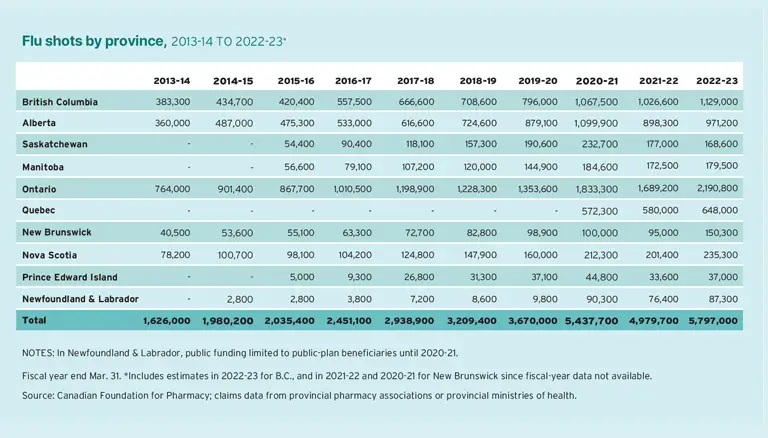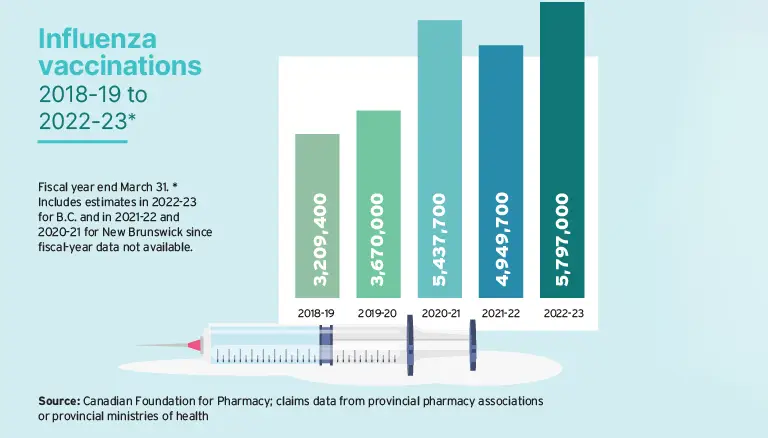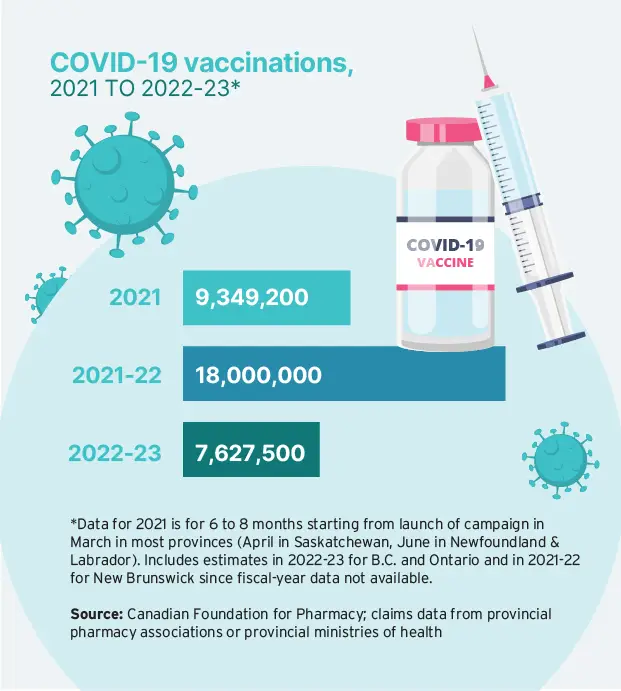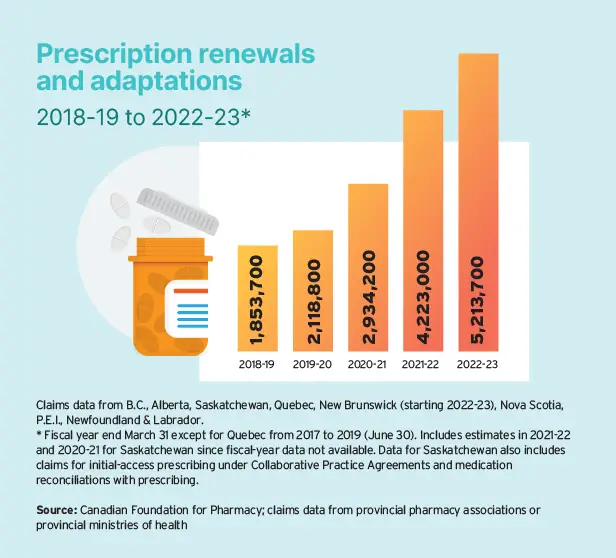
Pharmacists have set a record for influenza vaccinations and a scorching pace for prescription renewals and adaptations, according to the latest full year of claims data from provincial ministries of health. Almost every province reported significant gains—with Quebec leading the way for the second year in a row.



The Canadian Foundation for Pharmacy gathers provincial claims data for pharmacy services every year for its Services Chart. Below we highlight trends over the past five years or more for services that are publicly funded. All provinces operate with a fiscal year ending on March 31, therefore, unless otherwise stated, all data reported here are for the fiscal year ending on March 31, 2023. Numbers have been rounded to the nearest hundred.
The last few years have been a roller-coaster ride for flu shots in community pharmacies. During the first year of the pandemic, pharmacists (or other authorized pharmacy staff in some provinces, i.e., nurses, technicians and students) injected 48% more Canadians than the year before, or 5.4 million in 2020-2021 compared to 3.7 million in 2019-2020. Vaccinations then dropped by 9% in 2021-22, to 4.9 million, before climbing again, by 17%, to reach the new height of 5.8 million in 2022-23.
Note these numbers include estimates for B.C. in 2022-23 and for New Brunswick in 2021-22 and 2020-21 since final data for the fiscal year were not available for these time periods. Regionally, the biggest increase occurred in Ontario (30%). New Brunswick also recorded an increase well ahead of the national average of 17%, however the actual rate of increase is not reported since it is based on CFP’s estimates for the previous two years.
The number of COVID-19 vaccinations in pharmacies plummeted by more than half (58%) in 2022-23, though the total of 7.6 million is still well ahead (by 31%) of flu vaccinations. Time will tell if this result is the baseline for annual COVID-vaccination volume in pharmacies following the initial year-long campaign in 2021-22, during which pharmacies administered just 18 million doses.
Note these numbers include estimates for B.C. and Ontario in 2022-23 and for New Brunswick in 2021-22, since final data for the fiscal year were not available from these provinces’ ministries of health. Scanning the provinces, the biggest declines occurred in Alberta (-74%), Quebec -(71%), Nova Scotia (-70%) and Saskatchewan (-66%).
In provinces where pharmacies can bill for prescription renewals and adaptations, claims jumped by 24%, to 5.2 million, following huge gains of 44% in 2021-22 and 39% in 2020-21.
Pharmacies in all provinces except Manitoba and Ontario can bill the government for renewals. Governments in P.E.I. and New Brunswick were the most recent to bring in funding, in October 2022 and October 2021, respectively.
All provinces except Manitoba, Ontario and New Brunswick can bill for adaptations. Pharmacies in Nova Scotia, P.E.I. and Newfoundland and Labrador can do so to a limited extent, for beneficiaries of public drug plans. Coming results for 2023-2024 will see a boost in Nova Scotia, following the expansion of funding to all residents in July 2023.
On the renewals front, claims increased 16% to reach 4.4 million. B.C. led the charge with a 67% surge in claims following the government’s expansion of the program to include more medications in October 2022.
Quebec was at the forefront for adaptations, with claims more than tripling in 2022-23. Overall, claims more than doubled from 362,600 to 772,400. For the past two years, renewals outpaced adaptations by about 10 to one. That gap closed to about six to one in 2022-2023.
All provincial ministries of health have implemented programs that reimburse pharmacists for the prescribing and/or dispensing of Paxlovid for the treatment of COVID-19. The programs’ components and fees vary widely, as detailed in the provincial summaries below and in CFP’s Services Chart.
CFP was able to collect the first fiscal year of claims data for Paxlovid services from all provinces except Ontario. Overall, pharmacies in the nine provinces (i.e., excluding Ontario, where data was unavailable) billed for 98,000 Paxlovid services. That translates into an average of 14.5 interventions per pharmacy, based on pharmacy counts from the National Association of Pharmacy Regulatory Authorities.
The biggest headline for B.C. is the sharp rise in prescription renewals resulting from the program’s expansion to include a wider range of medications, including for mental-health conditions. Renewals increased 67% to 460,100, from 276,000 in 2021-22.
Prescription adaptations also rose significantly, by 30% to reach 47,000, after two years of double-digit declines.
Another good news story in B.C. is the initiation of funding, in mid-October 2022, for the administration of drugs by injection. In less than six months, pharmacies billed for 99,800 drug injections, which is an average of 67 per pharmacy.
On the vaccinations front, final fiscal-year data for influenza and COVID-19 vaccines in B.C. were not available. CFP determined estimates based on the previous year’s claims data and trending in other provinces. With that in mind, the estimates were 1.1 million flu shots in 2022-23, based on an increase of 10%, and 745,600 COVID-19 shots, based on a decline of 40%.
Final fiscal-year claims data for pneumonia vaccines appear to suggest that B.C. pharmacies helped the province achieve greater vaccine coverage several years ago, when numbers surged by 34% in 2019-20 and 44% in 2020-21. In total, 64,200 eligible persons were vaccinated in pharmacies during that two-year period. Pneumonia vaccinations then dropped by 54% in 2021-22, to 17,400, and by 24% in 2022-23, to 13,300.
Pharmacies’ claims for the administration of other vaccines, such as for HPV and chicken pox, climbed by 26% to reach 45,200 in 2022-23.
Medication reviews in B.C. appear to have stumbled and stalled since the start of the pandemic. Billings for Standard medication reviews dropped 16% in 2020-21, from 196,100 to 165,600, recovered somewhat in 2021-22 with a gain of 7%, then fell again by 5% during the latest fiscal year, to 168,400 reviews. Pharmacist Consultation reviews tell a similar story, declining 28% to 12,500 in 2020-21, rebounding 13% to reach 14,200 in 2021-22, then dropping again 30% to 12,700. Selected pharmacies in B.C. can dispense Paxlovid, billing $30 per assessment plus the usual dispensing fee. They can also bill $25 for follow-ups. In 2022-23, B.C. pharmacies were reimbursed for 10,500 assessments and 12,400 follow-ups.
Influenza vaccinations in Alberta pharmacies rallied in 2022-23, increasing 8% to 971,200. The previous year’s decline of 18% followed a record-setting year of 1.1 million flu shots in 2020-21. COVID-19 vaccinations were down 74%, reflecting the end of the initial campaign. Nonetheless, Alberta pharmacies administered an impressive 1.1 million COVID-19 vaccines.
Other vaccines also saw strong growth: pneumonia vaccinations were up 20% in 2022-23, to 15,800—although this is still below the record highs of 26,200 in 2020-21 and 23,400 in 2019-20. And Tdap injections rose 13% to 13,300, a continuation of several years of growth.
Prescription renewals grew 12% to reach a new high of 1.3 million in 2022-23. Adaptations rallied after two years of double-digit declines: claims increased 26% to 180,600 in 2022-23, coming close to the pre-pandemic high of 191,500.
Prescribing services to initiate or manage therapy rose sharply, by 54%, in 2022-23. Pharmacists with additional prescribing authority (APA) submitted a record high of 492,000 claims, following two years of reduced activity during the pandemic (-9% in 2021-22 and -21% in 2020-21).
After stuttering during the second year of the pandemic, comprehensive annual care plans (CACPs), a program unique to Alberta, rallied significantly. The 9% decline in 2021-22 was soundly set aside with a gain of 29% in 2022-23, resulting in a new annual high of 380,400. CACP follow-ups jumped 40% after a 12% decline, for a record high of 1.8 million in 2022-23. This translates into an average of 4.7 follow-ups per CACP. (Note: Claims for CACPs include assessments for minor ailments that result in a prescription.) In Alberta, pharmacists with APA can prescribe Paxlovid and bill the usual $25 per assessment for initiating a prescription. To dispense Paxlovid, pharmacies can bill $10 in addition to the usual dispensing fee. Separate claims data for Paxlovid prescriptions was not available. Data for dispensing the drug, however, was available, with 12,800 claims submitted.
Influenza vaccinations in Saskatchewan did not, unlike all other provinces, rally in 2022-23. Instead, claims dropped by 5%, on the heels of a 24% decline in 2021-22. The net result is 168,600 flu shots in 2022-23, well below the pre-pandemic number of 190,600.
COVID-19 vaccinations fell by 66%; however, this is consistent with other provinces. Saskatchewan pharmacies administered 214,400 COVID-19 shots in 2022-23.
Saskatchewan uses the single category of “prescriptive authority” to capture claims data for prescription renewals, adaptations, prescribing under Collaborative Practice agreements and prescribing as part of medication reconciliations. Claims within this category decreased slightly (-2.4%) to 390,100 in 2022-23 compared to 399,800 in 2021-22. These results are still higher than before the pandemic, in 2019-20, when pharmacies submitted 334,400 claims.
Assessments for minor ailments rallied somewhat in 2022-23, increasing 13% to 36,400 after a 17% decline (to 32,300) in 2021-22. The highest result was in 2019-20, when 38,800 claims were made. In Saskatchewan, as in Alberta, pharmacists can bill only for assessments that result in a prescription. All other provinces pay for assessments whether or not a prescription results. In Saskatchewan, pharmacists can bill $18 per assessment to prescribe or make a referral for Paxlovid, plus $20 to dispense. In 2022-23, 491 claims for assessments were submitted (dispensing claims not available).
Flu shots in Manitoba pharmacies increased 4% in 2022-23 to 179,500 after a 7% decline in 2021-22. Before the pandemic, during the 2019-20 fiscal year, pharmacists had administered 144,900 flu shots. COVID-19 vaccinations dropped to 300,700 from 445,800 in 2021-22, a difference of -33%.
Pneumonia vaccinations decreased for the second year in a row, by 4% in 2022-23 to 3,200 and 10% in 2021-22 to 3,400. Meanwhile, Tdap vaccines are seeing explosive growth. Claims jumped 72% to reach 5,900 vaccinations in 2022-23, after almost quadrupling the previous year, from 900 claims in 2020-21 to 3,400 in 2021-22. Manitoba pharmacies can bill $15 or the usual dispensing fee, whichever is lower, to dispense Paxlovid. They submitted 11,200 claims in 2022-23.
Influenza vaccinations in Ontario pharmacies surpassed 2 million for the first time, with a final tally of 2.2 million. The province also posted the highest year-over-year increase in 2022-23, gaining 30% versus the national average of 17%.
For COVID-19 vaccinations, claims data for the fiscal year was not available. Instead, CFP received data for the calendar years of 2022 and 2023, which it used to estimate a result for the fiscal year of 2022-23. With that in mind, CFP estimates that COVID-19 shots declined by almost half (46%), in Ontario, resulting in 3.9 million doses administered compared to 7.2 million in 2021-22.
After very little growth in 2021-22, medication reviews returned to double-digit growth rates in Ontario. MedsCheck Annual reviews jumped 31% to reach 657,800 in 2022-23, and MedsCheck for Diabetes rose even higher, by 48% to 187,800. Follow-ups also made impressive gains, although their frequency still falls well short of at least one follow-up per review. Pharmacies billed for 112,800 MedsCheck Annual follow-ups in 2022-23, an increase of 30%, and for 83,900 MedsCheck for Diabetes follow-ups, well over double the number in 2021-22 (32,000).
Claims for Pharmaceutical Opinions grew after two years of substantial decline. Available to beneficiaries of the provincial drug plan only, pharmacies in Ontario submitted 209,300 claims in 2022-23, up 20% from 175,200 in 2021-22. Before the pandemic, the claims count was 337,600.
Ontario’s minor ailments program launched on January 1, 2023. In just three months—that is, during the last three months of the fiscal year—pharmacists conducted and billed for 135,100 assessments. Pharmacists in Ontario can bill $19 per assessment for Paxlovid therapy, whether or not prescribing resulted, plus $13.25 to assess the medication. Unfortunately, claims data was not available for the 2022-23 fiscal year.
Pharmacies in Quebec administered 648,000 influenza vaccinations in 2022-23, 12% more than in 2021-22 (579,700). Unlike all other provinces, the total had not gone down significantly during the 2021-22 fiscal year, instead posting a small gain of 1%.
Consistent with other provinces, COVID-19 vaccinations dropped precipitously in 2022-23 in Quebec, by 71% to 516,000 (from 1.8 million in 2021-22).
The administration of other vaccines saw impressive growth—more than quintupling to 370,000 claims, compared to 65,400 in 2021-22. It’s worth noting that the shingles vaccine did not factor into this tally, since public funding began in May 2023, after the fiscal year ended.
As of January 1, 2021, expanded pharmacy services in Quebec were no longer subject to the co-pays and deductibles of province’s universal drug plan. Claims data since then dramatically tell the story of how the removal of this financial barrier has increased uptake of pharmacists’ services.
Even though only three months remained in the 2020-21 fiscal year, claims skyrocketed 108% for prescription renewals (to 683,500) and 150% for adaptations (40,000). The trajectories were even steeper in 2021-22: renewals surged by 156% to 1.7 million and adaptations more than quadrupled to 179,400.
In 2022-23, adaptations continued their impressive ascent, more than tripling to reach 585,000. While renewals appear to be levelling off, edging forward just 2%, the latest total remains impressive at 1.8 million.
Pharmacists’ assessments for minor ailments also continue to blaze trails, growing 76% in 2022-23 to 822,000 following an upsurge of 113% in 2021-22 (467,100).
Lastly, pharmacists in Quebec have the authority to assess and prescribe to help patients with certain chronic conditions reach therapeutic targets. While growth has not been as dramatic as for other services, it has been steady: in 2022-23, claims grew 11% to reach 310,600, following an increase of 17% in 2021-22 (278,800). Anticoagulation management is by far the top service billed, accounting for 74% of claims in 2022-23. In 2022-23, Quebec pharmacies could bill $22.31 per assessment for Paxlovid therapy (the fee has since increased to $23.43), whether or not a prescription resulted, and $10 plus the usual dispensing fee for dispensing. A total of 24,700 claims for assessments were submitted (dispensing data was not available).
For the past two years, CFP has had to estimate or omit much of the data for New Brunswick due to a change in reporting by government. Specifically, the reports had combined claims data for flu and COVID-19 shots, and for renewals and minor-ailment assessments. Fortunately, for the 2022-23 fiscal year, the province’s Ministry of Health supplied CFP with separate data for each service.
New Brunswick pharmacists administered 150,300 influenza vaccines in 2022-23, substantially more than CFP’s estimates of 95,000 in 2021-22 and 100,000 in 2020-21. And we can say with certainty that this latest result is 52% more than the 98,900 vaccines administered in 2019-20, when separate data for flu shots was last available.
COVID-19 vaccinations totaled 289,500 in 2022-23 compared to CFP’s estimate of 800,000 in 2021-22, which was based on separate government reporting for the two calendar years of 2021 and 2022.
Government funding for prescription renewals and assessments for uncomplicated urinary tract infections (UTIs) began in October 2021. Funding expanded to include assessments for shingles and contraception management in June 2022. The counts for these services were as follows for 2022-2023:
Pharmacists in New Brunswick can bill $20 per assessment for Paxlovid therapy, with or without prescribing, or to adapt, complete or correct an existing Paxlovid prescription. Just over 4,500 claims were made in 2022-23.
Pharmacists in Nova Scotia gave 17% more flu shots in 2022-23 to reach 235,300, topping the record set during the first year of the pandemic (212,300). During the year in between, flu shots dipped 5% to 201,400.
COVID-19 vaccinations plummeted to 394,500 from 1.3 million in 2021-22, a decline of 70%.
Prescription renewals rebounded, striding ahead 16% to 211,300 after stumbling 8% in 2021-22 to 182,400. Adaptations almost tripled, though the number was small to start at just under 800 in 2021-22, increasing to 2,000 in 2022-23. Substantial growth is expected in 2023-24 in response to expanded funding in June 2023 to make the service available to all residents (rather than beneficiaries of the public plan only).
Three years of claims data are now available for the two minor ailments funded by government, with double-digit gains all around. In 2022-23, assessments for UTIs grew 24% to reach 19,900 and claims for herpes zoster jumped ahead 37% to reach 1,700.
Meanwhile, initial assessments for contraception management grew just 5% in 2022-23 after tumbling 41% in 2021-22. Total claims were 3,300 in 2022-23 compared to 5,300 in 2020-21, year one of the program. Follow-ups increased 10% in 2022-23, to 1,900.
The first year of claims data for Nova Scotia’s Community Pharmacist-led Anticoagulation Management Service shows that pharmacies submitted 18,160 claims in 2022-23. Selected pharmacies in Nova Scotia can dispense Paxlovid and bill $3.50 in addition to the usual dispensing fee. They submitted 3,100 claims in 2022-23.
Influenza vaccinations increased 10% to 37,000 after a 25% decline in 2021-22 (33,600), and still well short of the high of 44,800 during the first year of the pandemic. COVID-19 vaccinations fell 43%, to 47,900 from 84,400.
In late February 2022, the provincial government began funding pharmacists to administer the shingles vaccine. By the end of fiscal year 2022-23, 19,700 eligible residents had been vaccinated.
Funding for prescription renewals began in mid-October 2022. In less than six months till the end of the fiscal year, pharmacies submitted claims for 16,800 renewals. Funding for UTI assessments also began in October 2022, resulting in 7,600 claims in less than six months. Pharmacists in P.E.I. can bill $25 per assessment for Paxlovid, with or without prescribing, as part of the province’s minor-ailments program. Just under 900 assessments were billed. The dispensing of Paxlovid, for which pharmacies can bill $5 on top of the usual dispensing fee, resulted in 7,700 claims.
Pharmacists administered 87,300 flu shots in 2022-23, a 14% gain after a 15% loss in 2021-22 (76,400). COVID-19 vaccinations fell 44% to 82,300 from 146,800 in 2021-22. With this results, Newfoundland and Labrador joins B.C. and Quebec as the only provinces where vaccinations for flu outnumber those for COVID-19.
In 2022-23, claims for renewals declined 10% to 77,200 after almost tripling in 2021-22 (85,700). That number is expected to rebound and then some, as funding was expanded to include all residents in April 2023 (rather than beneficiaries of public drug plans only). Adaptations, for which funding remains limited to public-plan beneficiaries, surged 76% to 4,400 from 2,500. The government pays pharmacies $20 to assess for Paxlovid eligibility, and the usual fee for dispensing. Assessments totaled 5,300 in 2022-23 and the medication was dispensed 4,600 times.
As part of its annual Changing Face of Pharmacy report, the Canadian Foundation for Pharmacy...
The federal and provincial governments have enacted a wide range of temporary laws, regulations...